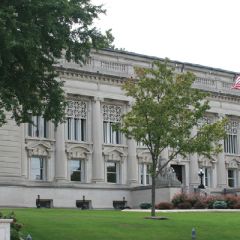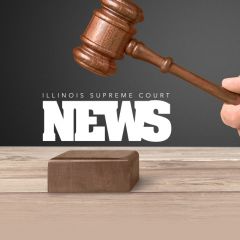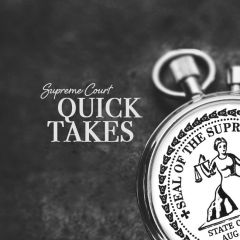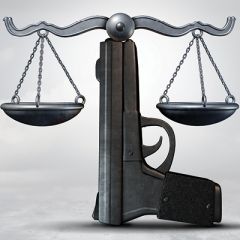Getting to the Illinois Supreme Court is a long shot. In any given year, the Supreme Court receives more than a thousand petitions for leave to appeal under Illinois Supreme Court Rule 315, notes Charles Insler in his May 2021 Illinois Bar Journal article, “Rule 317, Appeal as a Matter of Right.” From those thousand-plus petitions, the Court will allow leave to appeal in roughly 50 or 60 cases—about half of which are criminal and the other half civil. During the past five years, the odds of making it to the Supreme Court have ranged from one in 20 to one in 25. But what about Rule 317? The first part Rule 317 is clear and provides for automatic review in the Supreme Court when an appellate court has invalidated a state or federal statute. The second part of Rule 317, however, is less clear; but it provides an intriguing source for an appeal, as of right, to the Supreme Court, Insler explains.
Practice News
-
May 24, 2021 | Practice News

-
May 21, 2021 | Practice News

The Illinois Supreme Court Rules Committee will hear comments July 21, 2021, at a public hearing in Chicago on four proposals.
All the proposals, which must be approved by the Illinois Supreme Court before they could take effect, will be aired at a hearing before the Rules Committee at 10:30 a.m., Wednesday, July 21, 2021, in Room C-500 of the Michael A. Bilandic Building, 160 N. LaSalle St. in Chicago.
-
May 20, 2021 | Practice News

Our panel of leading appellate attorneys reviews the nine Illinois Supreme Court opinions handed down Thursday, May 20. Seven of the cases are civil and two are criminal.
-
May 20, 2021 |
Practice News
The UIC John Marshall Law School will change its name to the University of Illinois Chicago School of Law after receiving approval from the University of Illinois Board of Trustees today.
With all required approvals and agreements obtained in accordance with university processes and contractual obligations with the Legacy Law School Corporation and the Foundation Legacy Corporation (the successor legal entities that owned and operated the law school, and fund-raised for the school, before it became a part of UIC), the name change will be effective July 1, 2021.
-
May 19, 2021 |
Practice News
This is part two of a three-part video series on the Illinois Supreme Court’s remote access policy and e-filing developments, presented by the ISBA’s Standing Committee on Legal Technology.
-
May 18, 2021 |
Practice News
The Illinois Supreme Court announced the filing of lawyer disciplinary orders on May 18, 2021. Sanctions were imposed because the lawyers engaged in professional misconduct by violating state ethics law.
-
May 17, 2021 | Practice News

In his May Illinois Bar Journal Article, “FOID Where Prohibited,” Jake Crabbs addresses the intersection of two trends of 2020: 1) a tremendous jump in gun ownership; and 2) the anecdotal rise of domestic violence during shelter-in-place conditions. These two trends intersect in the provisions of the Illinois Domestic Violence Act of 1986 and the Firearm Owners Identification (FOID) Card Act. Prosecutors, criminal defense attorneys, family law practitioners, and gun owners should all be aware of the ways these statutes interrelate and the constitutional issues that may arise whenever an order of protection is entered against a FOID cardholder. These concurrent trends may eventually lead to an increase in the total number of petitions for orders of protection against respondents who have FOID cards, Crabb writes, especially when circuit courts finally return to full capacity. This is not to suggest that FOID cardholders are more likely to commit domestic violence, per se; it is simply a plausible result of the two unrelated trends. And when it comes to orders of protection against FOID cardholders, Crabb argues, there is a significant—and constitutionally infirm—gap in the governing statutes.
-
May 17, 2021 | Practice News

Illinois Court Help was launched today in order to connect people to the resources and information they need to go to court in Illinois. It is the first personalized court information service offered by the Illinois courts and one of the latest innovations created during the COVID-19 pandemic to make the courts and information more accessible.
-
May 10, 2021 | Practice News

Chief Justice Anne M. Burke of the Illinois Supreme Court will preside over a ceremony to administer the attorney’s oath to 271 new attorneys on Thursday, May 13, at 2 p.m. via live video broadcast. This bar admission ceremony is for all certified candidates who have passed the February 2021 bar exam.
-
May 10, 2021 | Practice News

As Susan Bart demonstrates in her May 2021 Illinois Bar Journal article, “Who Are My Qualified Beneficiaries?,” it is essential to determine the qualified beneficiaries of an irrevocable trust under the Illinois Trust Code (ITC). Qualified beneficiaries have rights to receive notices of the existence of the trust and certain events, information about the trust, and accounts. But qualified beneficiaries may also be necessary parties to certain actions, such as a nonjudicial settlement agreement. A trustee who fails to correctly identify qualified beneficiaries, Bart notes, may breach her or his duties to provide information to qualified beneficiaries, or may provide information to beneficiaries who are not required to receive it. The Uniform Trust Code (UTC), upon which the ITC was based, uses the concept of “qualified beneficiary” to limit the class of beneficiaries to whom certain notices must be given or consents received. Bart introduces several kinds of scenarios that unpack the differences between qualified beneficiaries and remote and contingent beneficiaries under the new ITC.

